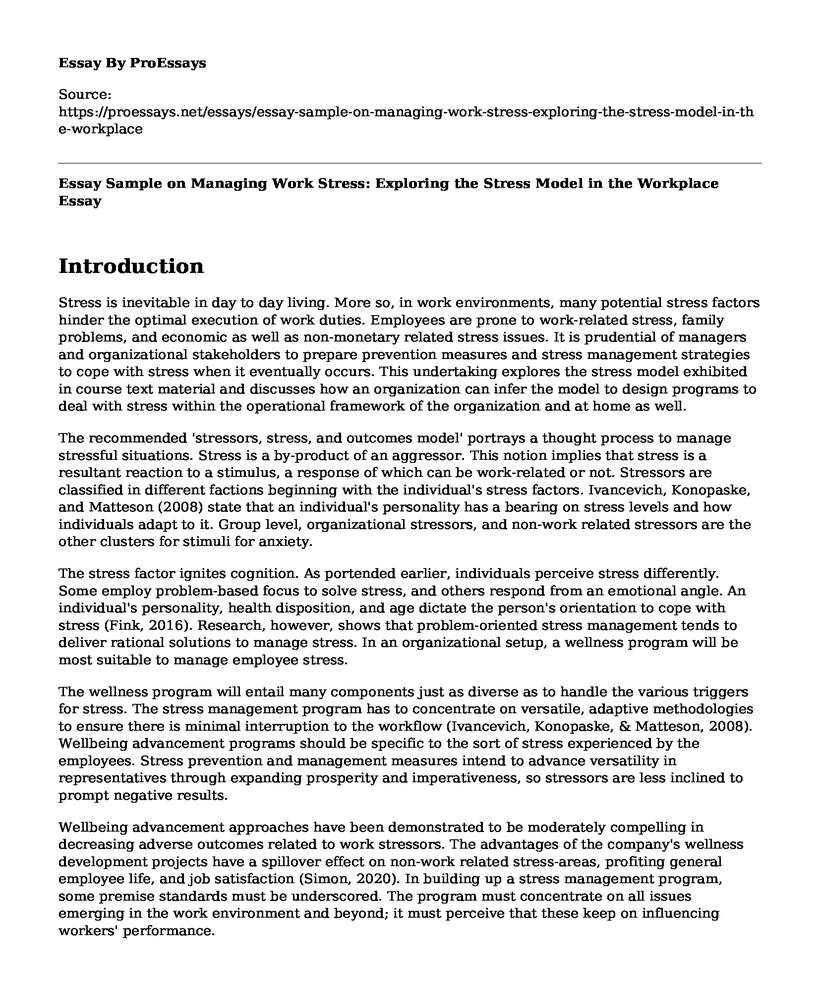Introduction
Stress is inevitable in day to day living. More so, in work environments, many potential stress factors hinder the optimal execution of work duties. Employees are prone to work-related stress, family problems, and economic as well as non-monetary related stress issues. It is prudential of managers and organizational stakeholders to prepare prevention measures and stress management strategies to cope with stress when it eventually occurs. This undertaking explores the stress model exhibited in course text material and discusses how an organization can infer the model to design programs to deal with stress within the operational framework of the organization and at home as well.
The recommended 'stressors, stress, and outcomes model' portrays a thought process to manage stressful situations. Stress is a by-product of an aggressor. This notion implies that stress is a resultant reaction to a stimulus, a response of which can be work-related or not. Stressors are classified in different factions beginning with the individual's stress factors. Ivancevich, Konopaske, and Matteson (2008) state that an individual's personality has a bearing on stress levels and how individuals adapt to it. Group level, organizational stressors, and non-work related stressors are the other clusters for stimuli for anxiety.
The stress factor ignites cognition. As portended earlier, individuals perceive stress differently. Some employ problem-based focus to solve stress, and others respond from an emotional angle. An individual's personality, health disposition, and age dictate the person's orientation to cope with stress (Fink, 2016). Research, however, shows that problem-oriented stress management tends to deliver rational solutions to manage stress. In an organizational setup, a wellness program will be most suitable to manage employee stress.
The wellness program will entail many components just as diverse as to handle the various triggers for stress. The stress management program has to concentrate on versatile, adaptive methodologies to ensure there is minimal interruption to the workflow (Ivancevich, Konopaske, & Matteson, 2008). Wellbeing advancement programs should be specific to the sort of stress experienced by the employees. Stress prevention and management measures intend to advance versatility in representatives through expanding prosperity and imperativeness, so stressors are less inclined to prompt negative results.
Wellbeing advancement approaches have been demonstrated to be moderately compelling in decreasing adverse outcomes related to work stressors. The advantages of the company's wellness development projects have a spillover effect on non-work related stress-areas, profiting general employee life, and job satisfaction (Simon, 2020). In building up a stress management program, some premise standards must be underscored. The program must concentrate on all issues emerging in the work environment and beyond; it must perceive that these keep on influencing workers' performance.
Conclusion
In conclusion, the organization's stress management program should recognize that stress is contagious. It influences specific people as well as those about them with whom they should relate and team up. Along these lines, managing pressure is, at the same time, therapeutic and preventive. However, in as much as the organization has a responsibility to manage stress at work, adapting to pressure is intrinsically an individual obligation. The organization only provides a platform through which stressed employees could fall back and experience relaxation and relief from whatever is troubling their performance level.
References
Fink, G. (2018). Stress concepts, cognition, emotion, and behavior: Handbook of stress series volume 1. San Diego, CA, USA: Elsevier Science.
Ivancevich, M. J., Konopaske, R. and Matteson, M. T., (2008). Organizational Behavior and Management. (8th ed.). Boston: McGraw-Hill/Irwin.
Simon, T. (2020). Why Employers should care about their employee caregivers. Benefits Quarterly, (36). Retrieved from https://www.iscebs.org/Documents/PDF/bqpublic/BQ1Q_Simon.pdf
Cite this page
Essay Sample on Managing Work Stress: Exploring the Stress Model in the Workplace. (2023, May 07). Retrieved from https://proessays.net/essays/essay-sample-on-managing-work-stress-exploring-the-stress-model-in-the-workplace
If you are the original author of this essay and no longer wish to have it published on the ProEssays website, please click below to request its removal:
- Cognitive Behavior Therapy in Social Work Essay
- Self-Care: Mindful Running Essay Example
- Paper Example on Gestalt Counseling
- Essay Sample on Mental Health and Substance Use Disorders in Adolescents in Alaska State
- ISO 14001 and AA1000 Regulations Paper Example
- Essay Example on Maximizing Team Performance in Retail: Analyzing Essential Factors
- Essay Example on Growing Older: How Healthcare is Adapting to an Aging Population







